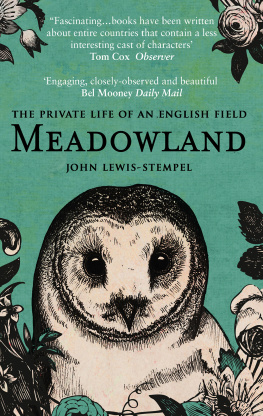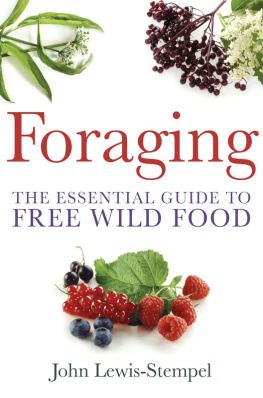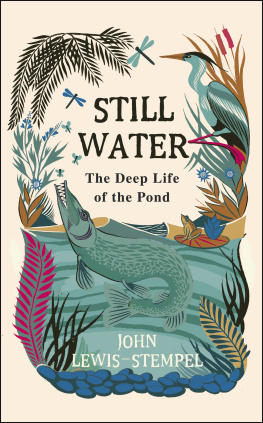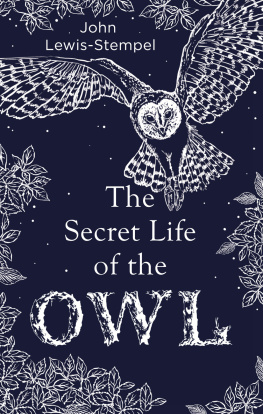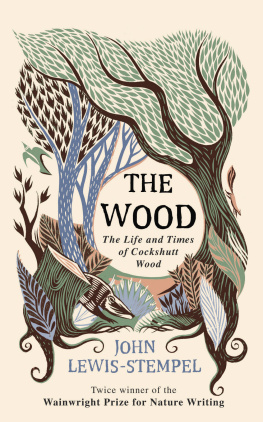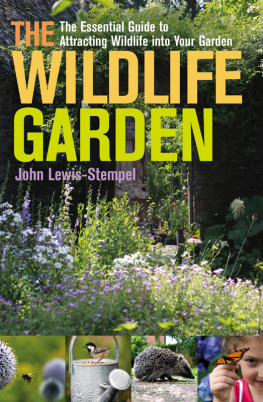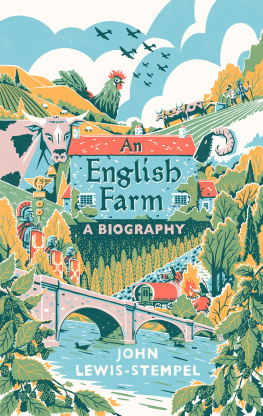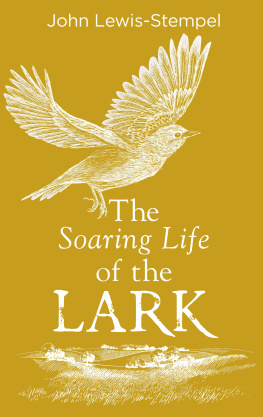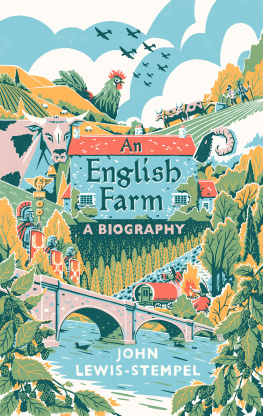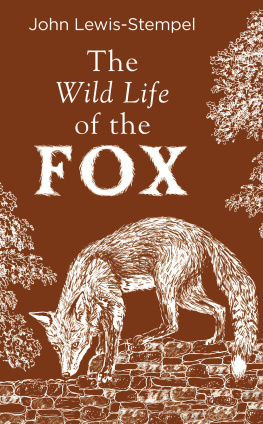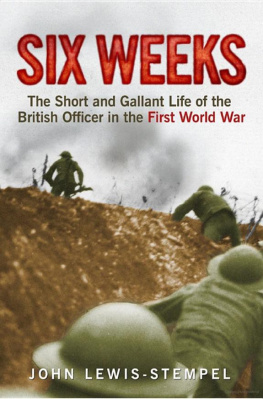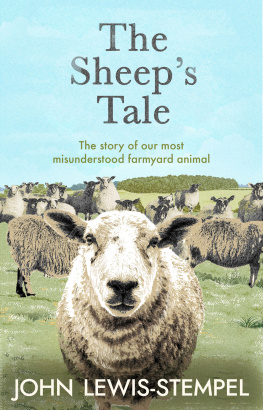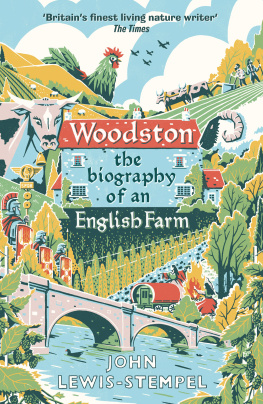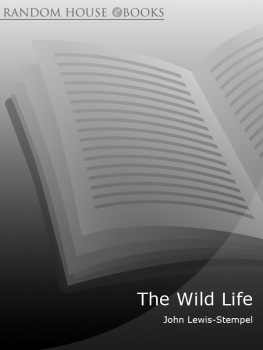CONTENTS
Also by John Lewis-Stempel:
England: The Autobiography
The Autobiography of the British Soldier
The Wild Life: A Year of Living on Wild Food
Six Weeks: The Short and Gallant Life of the British
Officer in the First World War
Young Herriot
Foraging: The Essential Guide to Free Wild Food
The War Behind the Wire: The Life, Death and
Glory of British PoWs, 191418

TRANSWORLD PUBLISHERS
6163 Uxbridge Road, London W5 5SA
www.penguin.co.uk
Transworld is part of the Penguin Random House group of companies
whose addresses can be found at global.penguinrandomhouse.com

First published in Great Britain by Doubleday
an imprint of Transworld Publishers
Copyright John Lewis-Stempel
John Lewis-Stempel has asserted his right under the Copyright, Designs and Patents Act 1988 to be identified as the author of this work.
Illustrations and map by Micaela Alcaino
A CIP catalogue record for this book is available from the British Library.
Version 1.0 Epub ISBN 9781448152582
ISBN 9780857521453
This ebook is copyright material and must not be copied, reproduced, transferred, distributed, leased, licensed or publicly performed or used in any way except as specifically permitted in writing by the publishers, as allowed under the terms and conditions under which it was purchased or as strictly permitted by applicable copyright law. Any unauthorized distribution or use of this text may be a direct infringement of the authors and publishers rights and those responsible may be liable in law accordingly.
2 4 6 8 10 9 7 5 3 1
About the Book
In exquisite prose, John Lewis-Stempel records the passing seasons in an ancient meadow on his farm. His unique and intimate account of the birth, life and death of the flora and fauna from the pair of ravens who have lived there longer than he has to the minutiae underfoot is threaded throughout with the history of the field, and recalls the literature of other observers of our natural history in a love song to the land that follows the tradition of Jeffries, Mabey and Deakin.
For Penny, Tristram and Freda. Of course.
PREFACE
I can only tell you how it felt. How it was to work and watch a field and be connected to everything that was in it, and ever had been. To rationalize it... is pointless. The Romantic poet William Wordsworth was not always the most reliable recorder of the British countryside, but this he got right:
Sweet is the lore which Nature brings;
Our meddling intellect
Mis-shapes the beauteous forms of things
We murder to dissect.
THE ICE MOON is already rising over Merlins Hill as I go down to the field at late evening to watch for snipe. There is real cold on the back edge of the wind, which rattles the dead tin-foil leaves left clinging on the river oaks. As I open the gate, my heart performs its usual little leap at the magnificence of the view: the great flatness of the field, its picture-frame of hedgerows, the sloping smoothness of Merlins Hill to the left, then right around me the forbidding dam wall of the Black Mountains. There is snow along the top of the mountains, snow as smooth as wedding cake.
Stepping into the field is to step on to a vast square stage in which I am the last person on earth. There is not a house or person or car to be seen. It is the sort of field where, as you step in, you breathe out.
The snipe like the wet corner of the meadow, where the old ditch is broken, leaking out its contents, and where sharp sprigs of sedge have taken hegemony. The snipe have come in here late for the two nights past, where the ground is amiable to their dagger beaks and the sedge offers shelter.
Frost already spectres the grass of the field. A small flock of brown meadow pipits rise up in front of me, as though hesitantly climbing invisible stairs, chattering as they go. The nondescript meadow pipit is gregarious in winter, and is a true bird of grassland. The birds Latin name is Anthus pratensis; pratensis is Latin for of a meadow. Pipit is for the birds piping song; then again the bird is also known as cheeper, teetan and peeper in verbal reproduction of its call. All of which show how impossible it is to represent the complexity of birdsong in mere human words.
I slither down into the ditch at the far side of the field, which borders Grove Farm. This is the far west of Herefordshire, where England runs out, and the rain falls. This ditch, built to take the run-off from the fields above, is deep enough to have served a soldier in Flanders a century ago.
In the seeping red-walled ditch I wait with my arms propped on the top. I like waiting in the ditch, invisible. Sometimes I bring my shotgun, to shoot pigeons, pheasants and rabbits, but not snipe. The diminutive wader with the stiletto on its face is too rare a visitor to kill by my hand. It would be like murdering guests. A blackbird spinks in a far-away hedge.
The snipe do not come. But snipe are always mysterious; their plumage is sorcery, a camouflage of earth-blending bars and flecks. After about forty minutes when I am old and stiff with cold, and about to clamber up the ditch side, I see, from the corner of my eye, a dim shape pushing under the fence wire, leaving yet more of his silver bristles on the bottom strand of barbs.
We attribute almost supernatural olfactory powers to animals, but the truth is with the wind blowing towards me he is oblivious to my presence.
I recognize him as he advances into the field by his dragging back leg. Its the old boar badger. Badgers do not truly hibernate but he has been underground for days, avoiding the searing hoar frosts. Brock is a Nazi, a follower of Goerings maxim Guns Before Butter. Although he must be hungry, he chooses first to patrol his territory.
Amusingly, the eastern boundary of his territory is the same as ours; he has adopted the humans stock fence as his national border. Along this the badger now shambles, black-and-white snout to the ground, stopping every five yards to squat and scent. The sun has long since perished, and in the quarter moonlight I can only make out his progress by the startling luminescence of the white bands on his head.
Satisfied with his noisome defences, he starts to haul himself across the field towards me.
For a sizeable mammal, badgers like the smallest morsel to eat. When he is within twenty yards I see he is flipping over old cow pats, with all the aplomb of a pizza chef. In this cold there can be few worms, but in late summer, when the grass has been cut for hay and it has rained lightly, I have seen the whole badger family out hoovering up earthworms by the hundred. A badger can easily eat 20,000 earthworms in a year. But then this 5.7-acre field probably hosts 6,000,000 Lumbricus terrestris; the badgers are unlikely to run out.
Tonight, however, the pickings are poor and he shuffles off. I follow his lead. Which is as it should be. He has primacy. The badger is the oldest landowner in Britain, and roamed the deciduous forests of southern England long before the Channel cut us from the Continent. On the way across the field I push over some cow pats with my wellingtoned foot to see what the badger was eating. Small, glistening grey slugs.
Next page
